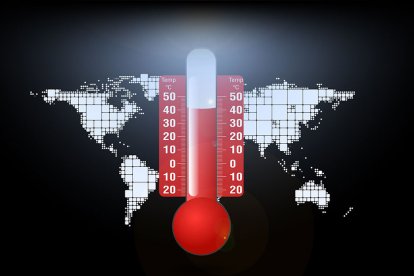Ecoalarmism: highest temperatures ever?
Lack of data over much of the Earth's surface, environmental differences between areas, measurement criteria and other sources cast doubt on heat records.

(Pixabay)
Are we really in the "hottest days ever"? Does this heat really indicate that climate change has reached a point of no return? Is Earth about to become a frying pan or a pot? Despite the tremendous information and the objective scorching thermal sensation, these statements are risky, to say the least. How can it be assumed that we are recording the highest temperatures ever... when we have no records prior to two centuries ago, for example? Moreover, the data supporting these maximums are not absolute, but there are differences of up to 5º with respect to other measurements. Nor does it help that old charts disprove the ecoalarmism, or that official studies reduce the impact of what they call the "climate crisis" on the real lives of citizens and the economy.
62.6º or 57.5º Fahrenheit last week?
The news reported that "the hottest days in history" came last week, when the average temperature of the planet reached 62.6º Fahrenheit. A news item that the media have repeated ad nauseam. The source is a climate reanalyzer located at the University of Maine, based on satellite temperatures and computer models. However, other sources, such as temperature.global, which makes an arithmetic estimate based on data from more than 65,000 weather stations, spoke of 57.5º.
In addition, there are other aspects that cast doubt on the reliability of this data. First, as Steve Milloy points out in The Wall Street Journal "the notion of 'global average temperature' is meaningless. Average global temperature is a concept invented by and for the global-warming hypothesis. It is more a political concept than a scientific one. The Earth and its atmosphere is large and diverse, and no place is meaningfully average." Milloy also points out that, in addition to the fact that there are no global temperature records from 125,000 years ago, those that exist before satellites do not have the same reliability as later ones.
Corrupt data from 96% of U.S. stations
There are two more points to consider. According to Milloy, "An estimated 96% of U.S. temperature stations produce corrupted data. About 92% of them have a margin of error of one degree Celsius, or almost 2 degrees Fahrenheit. The lack of precision of reported temperatures, whether estimated or measured, is not reassuring." Moreover, despite talk of "global temperature," in reality, "much of the Earth's surface is not measured at all. Although the National Oceanic and Atmospheric Administration likes to present global temperatures beginning in 1880, regular collection of temperatures at places like the north and south poles began much later."
As to what they will mean for the planet, if the end of the world is approaching, the official agencies themselves recognize, as soon as they are careless, the reality. For example, a report by the White House Council of Economic Advisors and the White House Office of Management and Budget on the impact of climate change onnational Gross Domestic Product concluded, that the rise - attributed to man's action on the climate - of 2.2° Fahrenheit, has barely meant a 0.5% drop in GDP.
Experts point out that many of the state heat records predate 1960
Finally, there is the direct manipulation of reality to alarm the population. Something that Tony Heller has been denouncing for years. Regarding the records of the last few dates. The expert dismantles many of the heat "records" these days, with visits to the newspaper archive, as well as retrieving NASA graphs on temperature in 1999 and comparing them with those published 20 years later, and even visiting wikipedia:
RECOMMENDATION





















